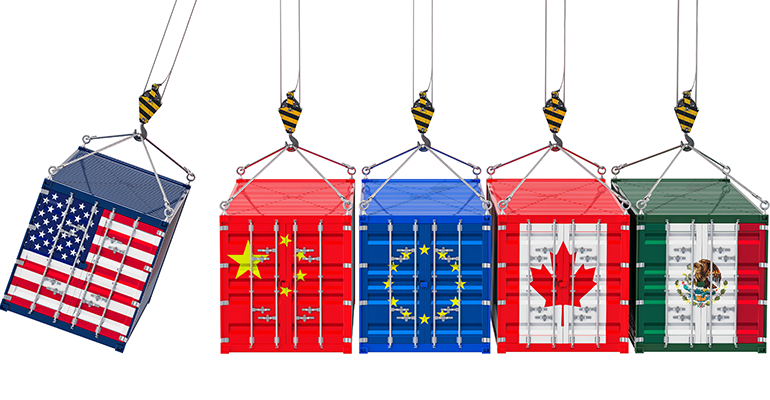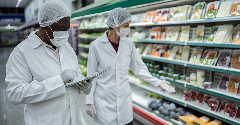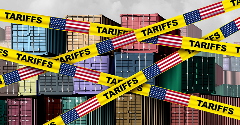News
Tariff volatility leaves food manufacturers in limbo
11 Mar 2025Rapid US trade policy shifts and tariff escalations are creating uncertainty for food manufacturers and ingredient suppliers.
In early March, the US imposed 25% tariffs on imports from Mexico and Canada, only to exempt or delay some of them just two days later.

Around the same time, the US increased its blanket tariff on Chinese goods to 20%, prompting China to introduce retaliatory tariffs of 10 to 15% on US agricultural products, including chicken, beef, pork, wheat, and soybeans. The Trump administration has also threatened tariffs on products imported from the European Union (EU).
US stock markets have experienced a swift and steady decline since the latest round of tariffs, with Trump’s inability to rule out a domestic recession adding fuel to the fire.
The resulting economic headwinds and unpredictability are making it difficult for businesses to plan long-term sourcing and pricing strategies, but manufacturers are increasingly turning to nearshoring, supplier diversification, and currency hedging to reduce exposure to tariff risks.
Some manufacturers are looking at expanding production in the US to minimise dependence on imports affected by trade restrictions.
Rising costs and supply chain instability
US tariffs on Mexico and Canada have already disrupted ingredient supply chains, even as some products have been exempted.
According to Rabobank analysts Tom Bailey and Owen Wagner, the impact on fresh produce prices is estimated to come to around 3%, while overall food costs could increase by 1%. Some importers have put purchases on hold, uncertain whether further policy adjustments will be made.
The impact extends beyond finished food products. According to Rabobank’s latest agribusiness report, Canada is expected to reduce its canola planting area by 0.4 million hectares, contributing to continued price volatility in oilseeds and vegetable oils.
At the same time, rising fertiliser costs from Canada are expected to increase expenses for US grain and oilseed farmers.
Food manufacturers are adjusting sourcing strategies to cope with uncertainty. Some are delaying purchases, while others are seeking alternative suppliers.
Industry groups, including the Food Industry Association (FMI) and the Consumer Brands Association, have warned that thin profit margins leave little room to absorb additional costs, meaning some businesses may eventually have to pass higher prices on to consumers.
Global trade realignment
China’s response to US tariffs is also affecting US agricultural exports.
“By imposing unilateral tariffs, the US has violated WTO [World Trade Organization] rules and disrupted the security and stability of the global industrial and supply chains,” said National People’s Congress spokesperson Lou Qinjian.
China’s retaliatory import duties on soybeans, pork, beef, wheat, and chicken are expected to significantly reduce demand for US exports in these categories. The Financial Times reported that US grain prices have been dropping since mid-February, as traders anticipate lower Chinese purchases of soybeans, wheat, and corn.
While the Trump administration has signalled interest in imposing tariffs on European food and agriculture products, those have not yet been enacted.
According to Rabobank analysis, if US tariffs on EU goods are introduced, wine, spirits, dairy, and processed foods would likely be the hardest hit. While US importers would initially bear the cost, European producers could face pressure to cut prices or shift supply to alternative markets.
It should not come as a surprise that the EU has recently expanded its trade partnerships with other nations. In recent months, the EU has finalised a trade deal with Mercosur, updated its trade agreement with Mexico, and resumed free trade negotiations with Malaysia.
Brussels has also sought to strengthen trade ties with India, with European Commission President Ursula von der Leyen and other senior EU officials visiting the country last month.
US tariffs: What comes next?
If there is one certainty in the current global trade environment, it is uncertainty.
With multiple possible outcomes and no clear timeline for resolution, food manufacturers must contend with an unpredictable landscape. The extent of disruption will depend on whether tariffs become entrenched or remain a bargaining tool in broader trade negotiations.
Having long embraced the moniker of “Tariff Man”, Trump’s eagerness to use tariffs as a negotiation tool means that there will likely be further tariff threats, implementations, revocations, and modifications.
If trade tensions do continue to escalate, further retaliatory measures could snowball. China has so far targeted US agricultural exports, but additional tariffs on processed foods or ingredients cannot be ruled out.
Similarly, if the US moves forward with tariffs on European imports, the EU could respond with duties on American food and beverage products, affecting exports of items such as spirits and processed grains.
Related news

NMN: An on-trend ‘fountain of youth’ ingredient for anti-ageing products
24 Oct 2025
Dubbed an “on-trend fountain of youth ingredient” by Mintel, NMN is booming in anti-ageing ingestible products in Asia – but regulatory roadblocks are thwarting NPD efforts elsewhere, say experts.
Read more
Food security-insecurity gap grows, hitting vulnerable regions hardest
16 Oct 2025
While food security has increased in most countries, the world’s most vulnerable nations’ struggles continue and intensify, a USDA analysis reveals.
Read more
India’s biscuit and cookie consumers want extra indulgence
16 Sep 2025
Premiumisation, health consciousness, and a focus on texture are driving new product developments (NPD) in the Indian biscuit and cookie market, Mintel figures suggest.
Read more
Climate change threatens matcha supplies as social media fuels matcha mania
8 Sep 2025
Matcha’s popularity is rising across the globe, yet shrinking harvests caused by record-breaking heatwaves in Japan are dwindling global supplies.
Read more
Australia's snacking sector achieves near-universal appeal
22 Aug 2025
As many as 99% of Australian consumers snack daily, with generational differences and increasing demands presenting novel manufacturing opportunities, according to Mintel data.
Read more
World Food Safety Day shines a spotlight on science
19 Jun 2025
On 7 June, the World Health Organization (WHO) held its annual World Food Safety Day, highlighting the role scientific research and innovation play in supporting consumers’ health.
Read more
Africa and Middle East most vulnerable markets to food fraud
28 May 2025
Consumers in Africa and the Middle East face a higher risk of consuming adulterated foods – especially with tariffs causing chaos in the global food supply chain, experts warn.
Read more
East takes on West in the fight for future food flavours
30 Apr 2025
Asian and South American flavours are now key components on global menus, driven by a growing global appetite for culinary mashups.
Read more
Will Trump lower tariff hikes?
25 Apr 2025
The US President’s plan to reduce the 145% tariffs on China’s food and beverage market raises questions over whether a turnaround is likely for other regions.
Read more
Future F&B flavours favour exploration and explosive taste profiles
25 Mar 2025
Exploration and experimentation will define the future of flavour, according to Mintel, as consumers seek out taste profiles and textures that offer an adventurous eating experience.
Read more